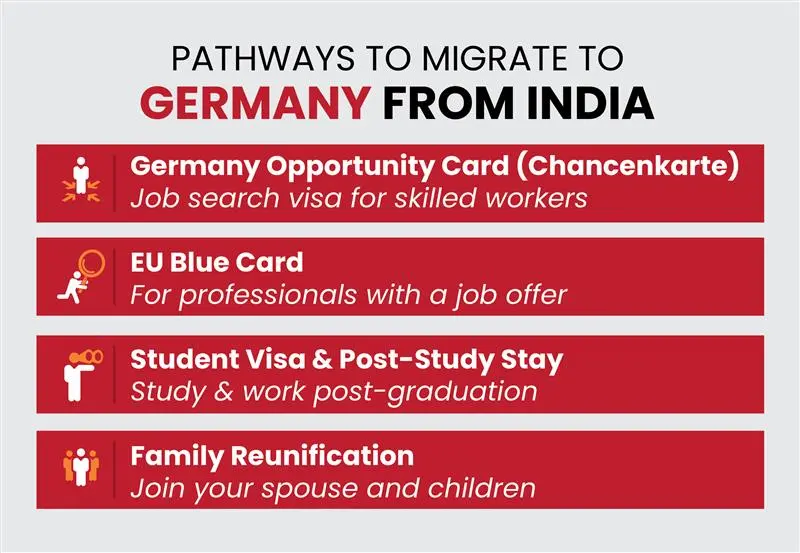Germany is one of the most popular destinations for Indians looking for better career opportunities, quality education, and a high standard of living. If you plan to migrate to Germany from India in 2026, this guide will help you understand the process step by step.
Table Of Content
1Is it worth moving to Germany from India?2What are the Pathways to Migrate to Germany from India?3How to Migrate to Germany From India4How much does it Cost to move to Germany?4Best Jobs in Germany for Indian4Conclusion5Frequently Asked Questions
Is it worth moving to Germany from India?
Yes, it is worth moving to Germany from India because the country offers excellent career growth opportunities, a strong economy, world-class healthcare, and free or low-cost education. The cost of living is reasonable compared to the high quality of life.
Benefits of Moving to Germany are:
- Strong job market with plenty of career opportunities
- Excellent healthcare and social security benefits
- High standard of living and modern infrastructure
- Public universities with low or no tuition fees
- Post-study work options for international students
- Child benefits and family-friendly policies
- Central location for easy travel across Europe
- Exposure to diverse cultures and experiences
What are the Pathways to Migrate to Germany from India?
Indians can migrate to Germany through several pathways, including the Germany Opportunity Card, EU Blue Card, Student Visa and Post-Study Residence Permit, and Family Reunification Visa.
1. Germany Opportunity Card (Chancenkarte)
- Germany Opportunity Card is a points-based visa system allowing skilled workers without a job offer to enter Germany and seek employment for up to 12 months.
- Eligibility requires at least two years of vocational training or a university degree from a recognised institution.
- Language proficiency required: German at A1 level or English at B2 level.
- Proof of sufficient financial means through a blocked account (Sperrkonto) or a formal obligation letter from a sponsor in Germany.
- Applications can be submitted online via the Consular Services Portal or in person at the German embassy.
- Points awarded for qualifications, experience, language skills, age, and other factors.
- Holders may work part-time (up to 20 hours per week) while job searching and can later transition to permanent residence.
2. EU Blue Card
- EU Blue Card is for highly qualified non-EU workers with a recognized university degree and a binding job offer in Germany.
- Job offer must match the applicant’s qualifications.
- Minimum gross annual salary threshold: €48,300.
- Reduced salary threshold: €43,759.80 for IT specialists and certain other in-demand professions.
3. Student Visa and Post-Study Residence
- Requires an acceptance letter from a recognized German university.
- Proof of language proficiency, financial means (blocked account), and health insurance are mandatory.
- Post-study residence permit allows graduates to stay up to 18 months to find employment in a relevant field.
4. Family Reunification
- The Family Reunification visa allows spouses, registered partners, minor unmarried children, and parents of minor children to join German residents or citizens.
- Requires valid passports and proof of family relationship.
- Applicant’s sponsor must provide residence permit or citizenship proof, employment contract, payslips, and health insurance.
How to Migrate to Germany From India
If you’re planning to migrate to Germany from India, here’s a step-by-step guide to help you navigate the process smoothly.
Step 1: Choose the Right Immigration Pathway
Germany offers multiple visa options based on your purpose:
- Opportunity Card (Chancenkarte): For skilled workers exploring job opportunities in their field in Germany for up to 12 months while job hunting.
- EU Blue Card: For highly qualified professionals with a valid job offer in Germany.
- Student Visa: For those pursuing higher education in Germany.
- Family Reunification Visa: For spouses or dependents joining family members already in Germany.
Step 2: Check Eligibility Requirements
Each visa category has specific eligibility criteria based on:
- Educational qualifications or vocational training.
- Relevant work experience.
- German or English language proficiency (typically A2 to B1 level for most work visas).
- Financial stability and proof of funds.
- Valid passport and a clean background record.
Step 3: Get Your Qualifications Recognized
- Before applying, ensure your academic or professional qualifications are recognized in Germany through the ANABIN database.
- Recognition improves your chances of employment and visa approval.
Step 4: Gather Required Documents
Common documents include:
- Valid passport and photographs.
- Educational certificates and transcripts.
- Updated resume or curriculum vitae.
- Work experience letters.
- Proof of language proficiency.
- Proof of funds or blocked account.
- Health insurance coverage.
- Visa application form and fee receipt.
Step 5: Apply for the Appropriate Visa
- Submit your visa application to the German Embassy or Consulate in India.
- Ensure all documents are accurate and complete.
Step 6: Travel to Germany and Register Locally
Once approved, travel to Germany and:
- Register your residence (Anmeldung) within 14 days of arrival.
- Open a local bank account and apply for a residence permit.
Step 7: Apply for Long-Term Residence or EU Blue Card
After working for a specified period, you can apply for a Permanent Residence Permit or EU Blue Card, which allows you to live and work in Germany indefinitely.
How much does it Cost to move to Germany?
On average, expect to spend between ₹12–15 lakhs for the initial move to Germany, excluding tuition (if applicable) or family relocation costs.
The cost to migrate to Germany from India varies depending on the type of visa, initial setup expenses, and monthly living costs. Applicants should budget for visa fees, document translations, health insurance, accommodation deposits, and daily expenses.
Best Jobs in Germany for Indian
The best jobs in Germany for Indians are primarily in these high-demand sectors:
1. IT and Software Development (software engineers, IT specialists, cybersecurity)
2. Healthcare (doctors, nurses, medical specialists)
3. Engineering (mechanical, electrical, automotive, renewable energy)
4. Finance and Accounting (finance managers, accountants)
5. Skilled Trades and Vocational Roles (electricians, welders, machine operators)
6. Research and Science (biotechnology, neuroscience)
7. Green Technology and Sustainability sectors
8. Management Consulting and Marketing roles
To know more about official pathways, visa types, and work opportunities, visit the Germany Immigration website – Make it in Germany, the Federal Government’s official portal for skilled professionals.
Conclusion
At CanApprove, we’ve successfully helped 100+ clients migrate to Germany from India through various pathways from skilled migration to study and work visas.
One of our recent success stories is Mr. Navas Khan, a Production Engineer who achieved his dream career in Germany through the Opportunity Card program. His journey stands as proof that with the right guidance, your Germany immigration can be smooth and rewarding.
Frequently Asked Questions






